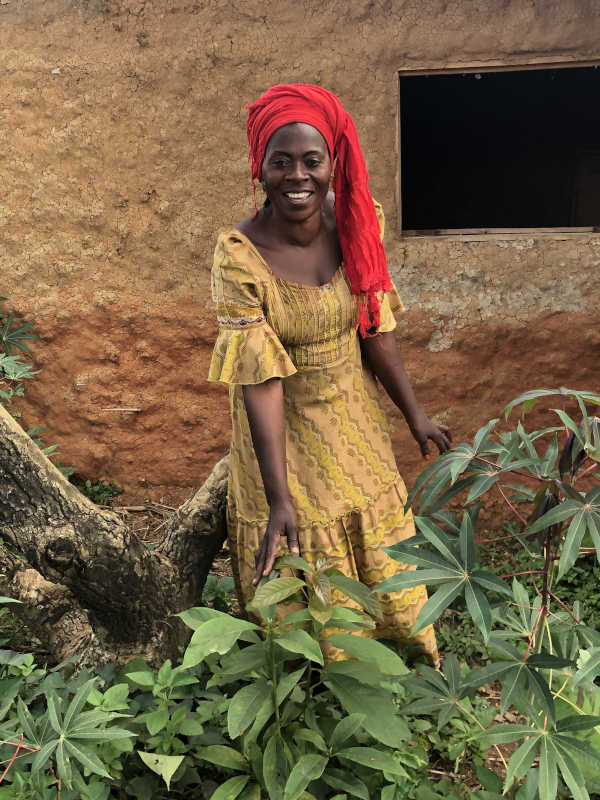 Pascaline Sango is a very busy woman. This 39-year-old mother arrived in the Nyankanda refugee camp in the east of Burundi in January 2020, after fleeing South Kivu in the Democratic Republic of Congo. She is not only the head of Ward 32 in the camp and a pastor, but also the vice-president of the parents’ committee. She is also the president of an agricultural cooperative with 75 members from among the refugees and their host communities.
Pascaline Sango is a very busy woman. This 39-year-old mother arrived in the Nyankanda refugee camp in the east of Burundi in January 2020, after fleeing South Kivu in the Democratic Republic of Congo. She is not only the head of Ward 32 in the camp and a pastor, but also the vice-president of the parents’ committee. She is also the president of an agricultural cooperative with 75 members from among the refugees and their host communities.
Sango is hard at work in the vegetable garden from five o’clock in the morning, hoeing and pulling weeds to grow fruit and vegetables. In less than a year, she has developed a lush vegetable garden on the plot around her house thanks to agroforestry training from the United Nations High Commissioner for Refugees (UNHCR). The project to support cooking energy and environmental restoration in the four refugee camps has been supported with about $1.42 million from the African Development Bank.
Sango grows amaranth, potatoes, cassava, sweet potatoes, avocados and passion fruit in her vegetable garden. “My children love fruit and vegetables. I am very happy to be able to give them fruit and vegetables every day and thus provide them with better nutrition,” says Sango, who often shares her produce with her neighbors. “It is a great honor to contribute to the improvement of my community’s quality of life.”
 In the five UNHCR-run camps in Burundi, refugees used to cut trees for firewood and cooking, negatively affecting the environment. The project, supported by the African Development Bank, introduced briquettes as an alternative and sustainable source of energy for cooking. The scheme also provided agroforestry training sessions to raise awareness of the importance of trees, and to promote reforestation and environmental preservation.
In the five UNHCR-run camps in Burundi, refugees used to cut trees for firewood and cooking, negatively affecting the environment. The project, supported by the African Development Bank, introduced briquettes as an alternative and sustainable source of energy for cooking. The scheme also provided agroforestry training sessions to raise awareness of the importance of trees, and to promote reforestation and environmental preservation.
Some 1,066 refugees and host community members received seeds and learned how to plant, monitor, and preserve trees. “The training went very well,” says Sango. “We are monitoring the trees, [observing] how they are developing. We are also empowering the refugees by showing them the importance of trees for oxygen, shade, fruit, and the way they help protect our homes from the weather.”

In two years, some 28,320 trees (including grevillea, eucalyptus, and cedrela) have been planted in and around the camps on a total area of 325 hectares. In addition, 62 hectares of trees have been identified and classified as a protected natural area. The aim is to minimize the environmental impact of deforestation and the effects of climate change, while creating better conditions for coexistence between the refugees and the host communities.
 The communities have benefited most from the knowledge and skills acquired from the training to plant fruit trees (avocado, mango) and garden plants (vegetables, tea, and other crops) in the plots surrounding their homes, improving their diet.
The communities have benefited most from the knowledge and skills acquired from the training to plant fruit trees (avocado, mango) and garden plants (vegetables, tea, and other crops) in the plots surrounding their homes, improving their diet.
The development of vegetable gardens is an unintended consequence of this project, which shows how interdependent the activity areas are, especially in situations of vulnerability. In these types of projects, the African Development Bank promotes a holistic approach to building sustainable resilience.
“We are very pleased with the way this project has turned out. Situations of fragility and their impact on the most vulnerable populations, including refugees, and on the environment are a major challenge. This collaboration with UNHCR has enabled us to make a lasting contribution to improving the lives of people we usually find it difficult to help,” said Daniel Ndoye, the African Development Bank’s Country Manager in Burundi.

This type of collaboration is one of the many success stories that will be shared at the Africa Resilience Forum scheduled for 28-30 September. Organized by the African Development Bank Group, the theme of the Forum is “Beyond Covid-19: Working Together for a Resilient Continent.” It will bring together different actors with the goal of accelerating state-building initiatives in the continent’s most fragile contexts.
